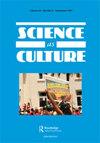Big Tech’s ‘Voracious Appetite,’ or Entrepreneurs Who Dream of Acquisition? Regulation and the Interpenetration of Corporate Scales
IF 2.4
3区 哲学
Q1 CULTURAL STUDIES
引用次数: 3
Abstract
At a conference of technology entrepreneurs in 2015, a moderator introduced a panel of executives in charge of mergers and acquisitions (M&A) for Facebook, Google, Twitter, and Yahoo. ‘We put it on the Eventbrite invitation: “What one question do you want answered?,”’ he announced. ‘By far, the audience’s most common response was “how do we get on your radar?”’ (Foundersuite, 2015). This event was not atypical; law firms who conduct and profit from corporate acquisitions host such panels regularly, and they archive them on YouTube for consumption by hopeful entrepreneurs everywhere. They indicate that dominant technology firms have become so not by internal expansion alone, but also by acquiring other firms. Between 2015 and 2020, Amazon made 42 acquisitions; Apple 33; Facebook 21; Google (Alphabet) 48; and Microsoft 53 (Motta and Peitz, 2020, citing multiple sources). These Big Tech companies, colloquially referenced as GAFAM, and their acquisitions, have come under public and regulatory scrutiny for their anti-competitive effects. What is rarely recognized is that Big Tech’s tendency to acquire startups and absorb their intellectual property, workers, and user base owes not only to its own ‘voracious appetite,’ as both the popular press and scholars describe it (Tiku, 2017; Glick et al., 2021). This tendency is also driven by the supply side, as it were, in that many founders of technology startups – and their investors – want to get acquired. This paper problematizes a popular but increasingly anachronistic view of competition which holds that entrepreneurs invent new products to win market share from incumbents. In the contemporary technology sector, this idealized process is often short-circuited; it is now common for startups to develop products which deliberately aim to compliment or enhance the offerings of established companies. The goal of many startups is not to compete with, but to get incorporated into, Big Tech. This current reality科技巨头的“贪婪胃口”,还是梦想被收购的企业家?规制与企业规模的相互渗透
在2015年的一次科技企业家会议上,一位主持人介绍了一个负责脸书、谷歌、推特和雅虎并购的高管小组我们把它放在Eventbrite的邀请上:“你想回答什么问题?”他宣布到目前为止,观众最常见的反应是“我们如何进入你的雷达?”(Foundersuite,2015)。这一事件并非非典型;从事企业收购并从中获利的律师事务所定期举办此类小组讨论会,并将其存档在YouTube上,供各地有希望的企业家消费。它们表明,占主导地位的科技公司不仅通过内部扩张,还通过收购其他公司而变得如此。2015年至2020年间,亚马逊进行了42次收购;苹果33;Facebook 21;谷歌(Alphabet)48;以及微软53(Motta和Peitz,2020,引用多个来源)。这些大型科技公司,俗称GAFAM,及其收购,因其反竞争效应而受到公众和监管机构的审查。很少被认识到的是,大型科技公司收购初创公司并吸收其知识产权、员工和用户群的趋势不仅归功于其自身的“贪婪欲望”,正如大众媒体和学者所描述的那样(Tiku,2017;Glick等人,2021)。这种趋势也受到供应方面的驱动,因为许多科技初创公司的创始人及其投资者都希望被收购。本文质疑了一种流行但越来越不合时宜的竞争观,即企业家发明新产品是为了从现有企业那里赢得市场份额。在当代技术领域,这种理想化的过程往往是短路的;现在,初创公司开发的产品往往有意赞美或提升老牌公司的产品。许多初创公司的目标不是与大型科技公司竞争,而是融入其中
本文章由计算机程序翻译,如有差异,请以英文原文为准。
求助全文
约1分钟内获得全文
求助全文
来源期刊

Science As Culture
Multiple-
CiteScore
5.20
自引率
3.80%
发文量
28
期刊介绍:
Our culture is a scientific one, defining what is natural and what is rational. Its values can be seen in what are sought out as facts and made as artefacts, what are designed as processes and products, and what are forged as weapons and filmed as wonders. In our daily experience, power is exercised through expertise, e.g. in science, technology and medicine. Science as Culture explores how all these shape the values which contend for influence over the wider society. Science mediates our cultural experience. It increasingly defines what it is to be a person, through genetics, medicine and information technology. Its values get embodied and naturalized in concepts, techniques, research priorities, gadgets and advertising. Many films, artworks and novels express popular concerns about these developments. In a society where icons of progress are drawn from science, technology and medicine, they are either celebrated or demonised. Often their progress is feared as ’unnatural’, while their critics are labelled ’irrational’. Public concerns are rebuffed by ostensibly value-neutral experts and positivist polemics. Yet the culture of science is open to study like any other culture. Cultural studies analyses the role of expertise throughout society. Many journals address the history, philosophy and social studies of science, its popularisation, and the public understanding of society.
 求助内容:
求助内容: 应助结果提醒方式:
应助结果提醒方式:


